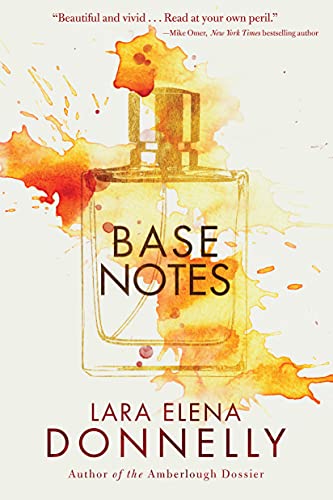Scent is the strongest link to our memories. What I do just makes a deeper connection. Brain chemistry or black magic — it’s unclear. People pay a lot of money for it, though. [loc. 231]
Vic Fowler has taken control of Bright House, a small and innovative perfumier in New York City, after the death of its founder (and Vic's lover) Jonathan Bright. Vic has developed a method for encoding memories in scent, and is contracted by plutocrat Joseph Eisner to create a perfume that will evoke a particular memory: the catch is, the memory is of an incident that Eisner never actually experienced. And, oh yes, Vic will need to commit three murders in order to produce the requested fragrance. Success will mean the financial salvation of Bright House: failure will mean that Eisner reveals Vic's part in a previous death, already being investigated by persistent PI Pippin Miles. To avoid suspicion, Vic enlists the help of three friends, and sets in motion a claustrophobic spiral of lust, greed, and death.
Like Donnelly's Amberlough trilogy, this is an exquisitely sensual book. Vic is a splendidly complex narrator, who perceives the world as much (more?) through smell than through sound or sight. There are some lush and unusual descriptions: 'the spermy scent of decorative pear trees', the metallic back-of-the-throat tang of gasoline. The character portraits at the beginning of the novel are exclusively olfactory, and every chapter opens with a scent portrait: “Notes de Tête: Ozone. Notes de Cœur: Burnt bacon. Notes de Fond: wet earth, gasoline.” And, as Vic stresses, the base notes -- the lingering odour, the filth, the dirt -- are as important as the top notes.
This is very much a New York novel, contrasting the glitter of Met galas and exclusive fetish clubs with the squalor of Vic's mildewy basement apartment and the constant pressure of trying to survive as an artist in a milieu where money matters more than anything else. "The rules are: they can push your rent up every year. The rules are: if you’re born rich you stay rich, and if you’re not you spend your whole life trying to get there." It's also a queer love story, an exploration of creativity, and an excursion into skewed morality and grotesque rationalisation that brings to mind early Poppy Z Brite, in particular Exquisite Corpse -- though with considerably more, albeit dark, humour.
I like the gradual sketching-in of Vic's past, and the occasional reminder that we are being told a story: "I expect the deeper we get into all this, the less and less you’ll like me. I’m not bothered. That’s not the point." And Vic, though fascinating and enigmatic, is not easy to like: sociopathic, selfish, and towards the end, as things begin to spiral out of control, slapdash. But I did like the novel very much, though somewhat uncomfortably: and it has made me want to wear perfume again, every day, despite the fact that most days nobody but me will smell it. (I would not wear one of Vic's specials, though.)
In Donnelly's afterword, she credits Jude Ellison Sady Doyle’s “My quest to find the great American perfume”, published in The Guardian. She doesn't mention her short story The Dirty American, which is very much a prequel to Base Notes. (There's an accompanying interview here.) I've never read Patrick Süskind's Perfume: The Story of a Murderer, though I understand it's a historical take on a similar premise, so can't comment on similarities to that novel: but Donnelly mentions it in interviews, and in Perfume: A Little Piece of Fiction to Wear Against Your Skin on Tor.com.
Fulfills the 'published in 2022' challenge of 52 books in 52 weeks. (Thanks, Amazon First advance copy!)

No comments:
Post a Comment